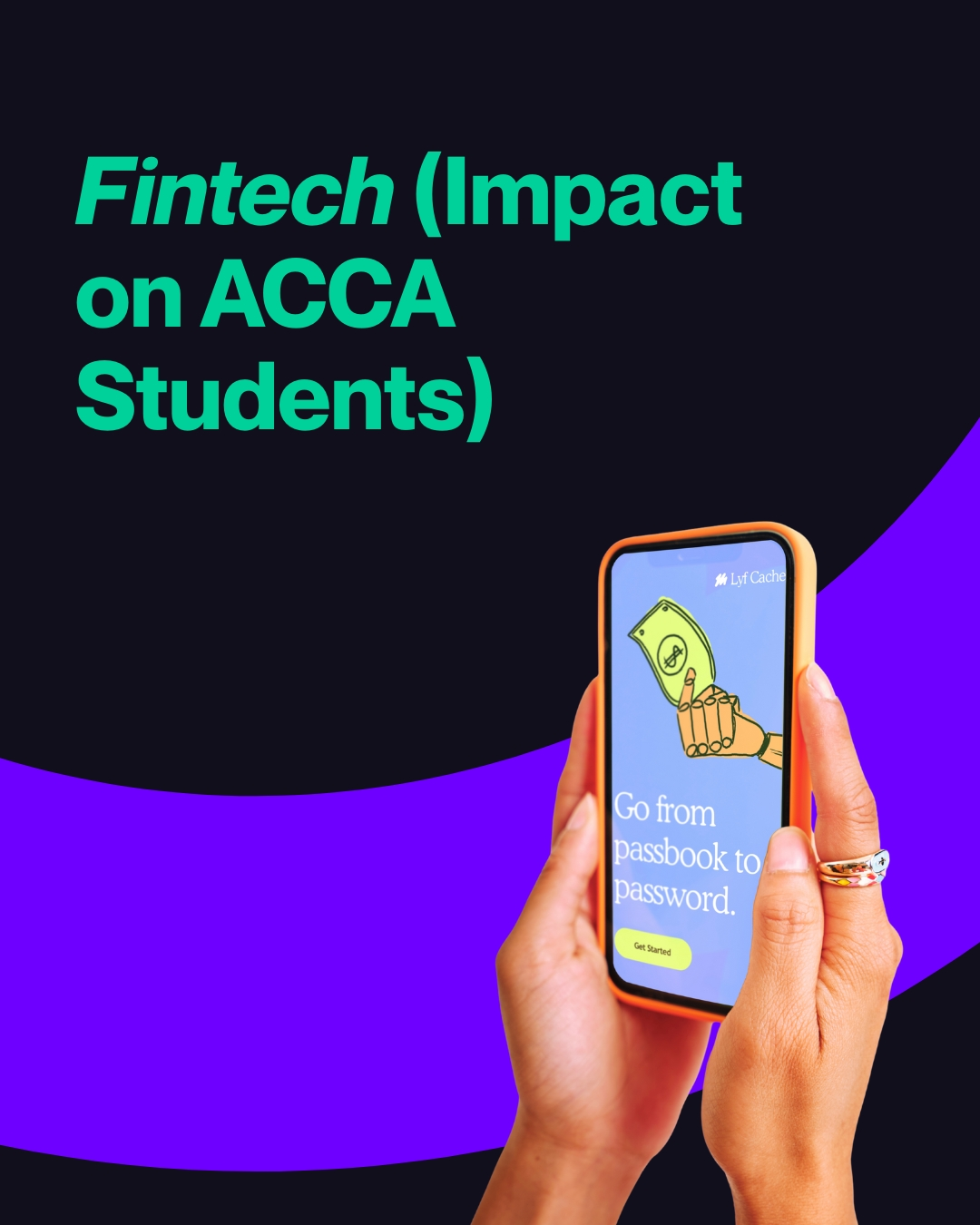Financial Technology (Fintech: Impact on ACCA Students
Technology has become a cornerstone of the modern finance industry, driving unprecedented changes in how financial services are delivered, consumed, and regulated. As the sector continues to evolve, so too does the experience of students aspiring to join the ranks of finance professionals. For ACCA (Association of Chartered Certified Accountants) students, fintech is not just an abstract concept but a tangible force that is reshaping their educational journey and future career prospects.
In this comprehensive blog, we will delve into how technology, particularly fintech, is influencing the finance sector, highlighting its impact on ACCA students and the essential skills that future finance professionals need to thrive in this rapidly changing landscape.
The Digital Transformation of ACCA Education
1. Digital Study Materials
Gone are the days when students had to rely solely on hefty textbooks and printed materials to prepare for their exams. Today, ACCA students have access to a wealth of digital resources that make studying more flexible, efficient, and interactive. Digital study materials, such as e-books, online tutorials, and interactive learning platforms, offer several advantages:
- Accessibility: Digital materials are accessible 24/7 from anywhere in the world, allowing students to study at their own pace and convenience.
- Up-to-Date Content: E-books and online resources are frequently updated, ensuring that students have access to the most current information and regulatory changes.
- Interactive Learning: Platforms like ACCA Study Hub offer interactive modules that include quizzes, video lectures, and real-time feedback, enhancing the learning experience.
2. Computer-Based Exams (CBE)
The introduction of computer-based exams (CBE) has been a game-changer for ACCA students. These exams are designed to reflect the digital nature of the modern finance environment, offering several key benefits:
- Flexibility: CBEs are offered more frequently than traditional paper-based exams, allowing students to choose exam dates that fit their schedules.
- Real-World Relevance: CBEs are designed to mirror the types of tasks finance professionals perform in the workplace, such as using spreadsheets, databases, and word processing software.
3. Online Revision and Mock Exams as offered by Megha Bhansali Classes
Online revision tools and mock exams have become essential components of ACCA preparation. Our revision and mock test allow students to practice under exam conditions, identify areas for improvement, and build confidence before the actual exam day. Features include:
- Timed Mock Exams: Simulate the pressure of the real exam with timed mock tests that replicate the format and difficulty level of actual ACCA papers.
- Instant Feedback: Receive detailed feedback on performance, including strengths and areas that need further study.
- Personalized Study Plans: Based on mock exam performance, students can create tailored study plans that focus on their specific needs.
4. Virtual Classrooms and Online Tutoring at Megha Bhansali Classes
Our virtual classrooms and online tutoring make ACCA preparation very easy, flexible, and affordable for students, key aspects include:
- Live Online Classes: Participate in real-time classes with expert tutors, ask questions, and engage in discussions with peers.
- Recorded Sessions: Access recorded sessions at any time, making it easier to review complex topics or catch up on missed classes.
- One-on-One Tutoring: Personalized tutoring sessions via video conferencing provide tailored support, helping students overcome specific challenges.
The Impact of Technology on ACCA Students’ Learning Experience
1. Enhanced Flexibility and Convenience
The digitalisation of ACCA study materials, exams, and tutoring services has made it easier for students to balance their studies with other commitments, such as work or family responsibilities. The ability to access resources and participate in classes from anywhere, at any time, has democratized access to ACCA qualifications, enabling a more diverse range of students to pursue their ambitions.
2. Increased Engagement and Retention
Interactive learning tools and personalized feedback have been shown to improve student engagement and retention of information. By actively participating in their learning journey, students are more likely to understand complex concepts and apply them effectively in their exams and future careers.
3. Preparation for the Digital Workplace
By incorporating technology into their study routine, ACCA students are better prepared for the digital tools and platforms they will encounter in the workplace. Familiarity with software such as Excel, data analytics tools, and financial modeling applications gives students a competitive edge in the job market.
4. Challenges and Considerations
While technology offers numerous benefits, it also presents challenges that ACCA students must navigate. These include:
- Technical Issues: Dependence on technology means that technical glitches, such as internet connectivity problems or software crashes, can disrupt studies or exams.
- Digital Literacy: Students must possess a certain level of digital literacy to effectively use online platforms and tools, which may require additional training or support.
- Screen Fatigue: Prolonged use of digital devices can lead to screen fatigue, which may impact concentration and overall well-being.
Preparing ACCA Students for the Future of Finance
Given the rapid pace of technological change in the finance industry, it is essential for ACCA students to equip themselves with the skills and knowledge needed to thrive in this evolving landscape. Here are some key areas of focus:
1. Embrace Digital Literacy
Digital literacy is no longer optional; it is a fundamental requirement for finance professionals. ACCA students should familiarize themselves with the digital tools and platforms that are shaping the industry, including data analytics software, financial modelling tools, and blockchain technology.
2. Develop Technical Skills
In addition to core finance and accounting knowledge, ACCA students should consider developing technical skills in areas such as coding, data analysis, and cybersecurity. These skills will not only enhance their employability but also enable them to contribute to the development and implementation of innovative financial solutions.
3. Focus on Continuous Learning
The finance industry is constantly evolving, with new technologies and regulations emerging regularly. ACCA students should adopt a mindset of continuous learning, staying updated on industry trends and pursuing additional certifications or training in relevant areas, such as fintech or AI.
4. Cultivate Strategic Thinking
As routine tasks become automated, the role of finance professionals is shifting towards strategic advisory and decision-making. ACCA students should develop their strategic thinking skills, with a focus on problem-solving, critical analysis, and risk management.
Conclusion
The role of technology has changed the way business works today and the same is adopted by ACCA and at Megha Bhansali Classes.
Recent posts
Categories
Book Your Personalised Career Consultation Today
Error: Contact form not found.



